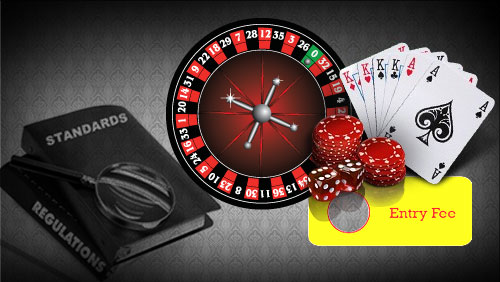 Philippine House Representative Peter “Sr. Pedro” Unabia has proposed legislation that would impose a Php3,500 (US $80) entrance fee for any Filipino who wants to play in a casino.
Philippine House Representative Peter “Sr. Pedro” Unabia has proposed legislation that would impose a Php3,500 (US $80) entrance fee for any Filipino who wants to play in a casino.
The charter of the Philippine Amusement and Gaming Corporation (PAGCOR) imposes no entry fees for anyone who wants to play in casinos, including Filipinos. Instead, PAGCOR has implemented its own control systems to manage players, including imposing minimum bets, issuance of player tracking-system cards and establishing casinos in places where financially inadequate individuals cannot enter including luxury resorts and 3-star hotels at the minimum.
Unabia, who represents Misamis Oriental, wants to use his House Bill 4859 to amend Presidential Decree 1869, also known as the Consolidating and Amending Presidential Decrees 1067-A, 1067-B, 1067-C, 1399 And 1632, Relative to the Franchise and Powers of [PAGCOR].”
Unabia laments PAGCORS’s supposed inaction in requiring Filipinos to pay an entry fee to any of the country’s casinos despite a section in PD 1869 that state that a resident “needs to have a gross income of at least Php50,000 for the previous year, as certified by the Bureau of Internal of Revenue to be allowed to play.”
VIETNAM PROF STUDIES PROPOSED CASINO LAW CHANGES
Over in Vietnam, Ministry of Finance recently completed a draft decree on casinos in Vietnam that includes provisions that any investor would have to commit $4 billion to a project and show their financial capabilities to ensure that they can afford that investment.
However, Stellar Management’s CEO/president and a Vietnamese professor, Augustine Ha Ton Vinh expressed his suggestions on the draft to ensure that the decree will help attract investors into Vietnam’s gaming industry.
Vinh told VietnaMnet Bridge that ‘international investors have recognized the government’s effort to open casino gaming in Vietnam but have also said that the current regulations are unreasonable and fail to meet current market standards’.
“Ho Tram Strip in Ba Ria-Vung Tau was licensed without meeting similar requirements set forth in the draft submitted for public comment in 2013. Investors in new integrated resorts will surely consider the requirements in this 2014 version an unfair practice,” Vinh added.
Vinh also called out Article 10 of the latest draft decree, which stipulates that ‘Vietnamese aged 21 and above with competence as defined by Vietnamese law can enter and play in casinos that are allowed to accept qualified Vietnamese.’ While it’s a step forward to finally allowing Vietnamese citizens to enter casinos, this stipulation’s vague use of the word ‘competence’ can be interpreted in different ways. “In reality, it’s impractical to assess each individual’s competence and financial capacity before allowing him or her to enter a casino,” he said.
“This particular industry needs strategic investors with international experience, such as Las Vegas Sands. The new casino decree needs to meet the demands of society, as well as investors. It’s time for senior government leaders to step in and open doors,” Vinh added.
Vinh has over 30 years of professional, technical, and management experience in the Asian-Pacific, European and West African regions, specializing in economic development strategies; management, regulatory and institutional reforms, bilateral & multi-lateral project finance and banking finance.